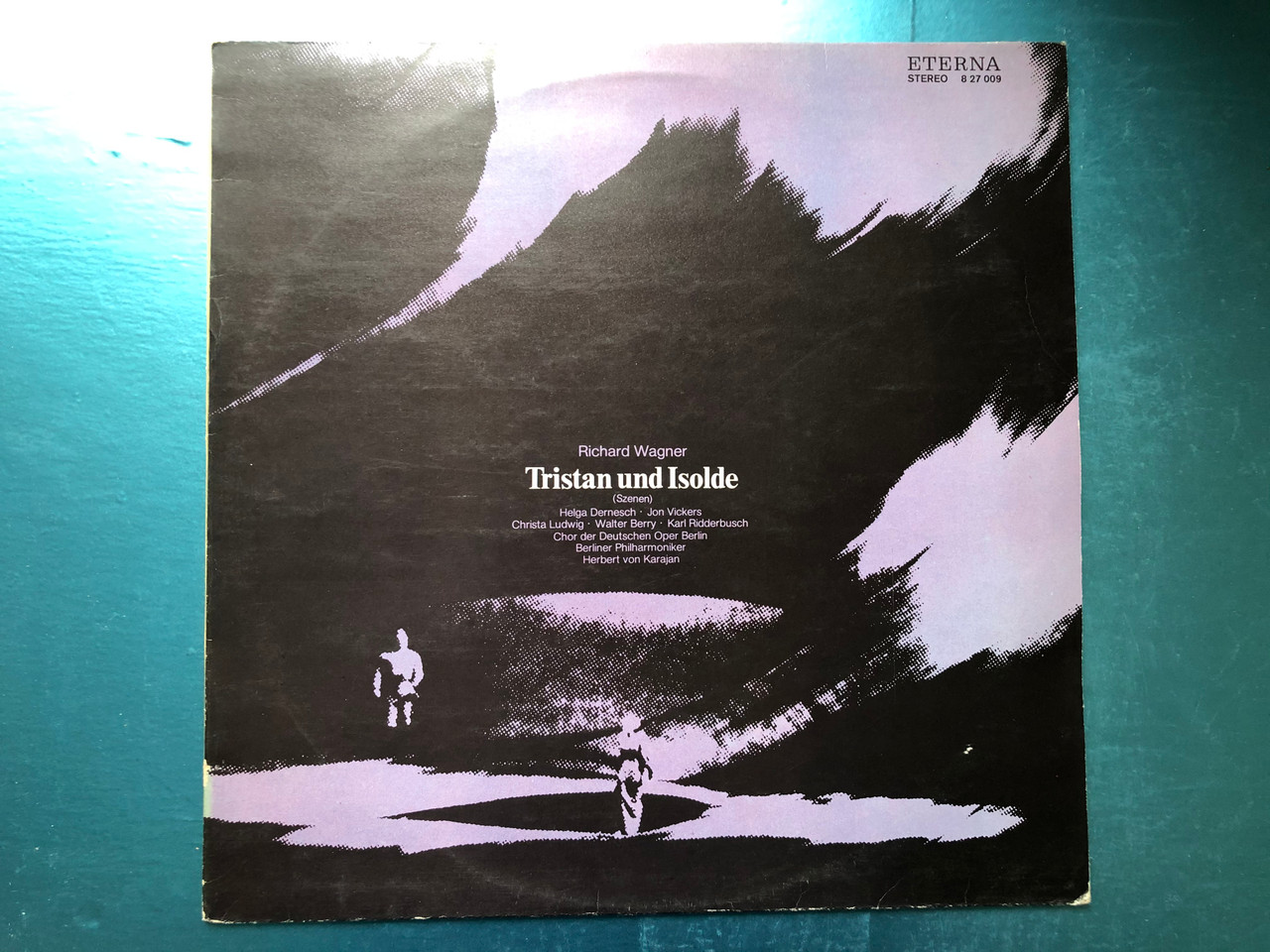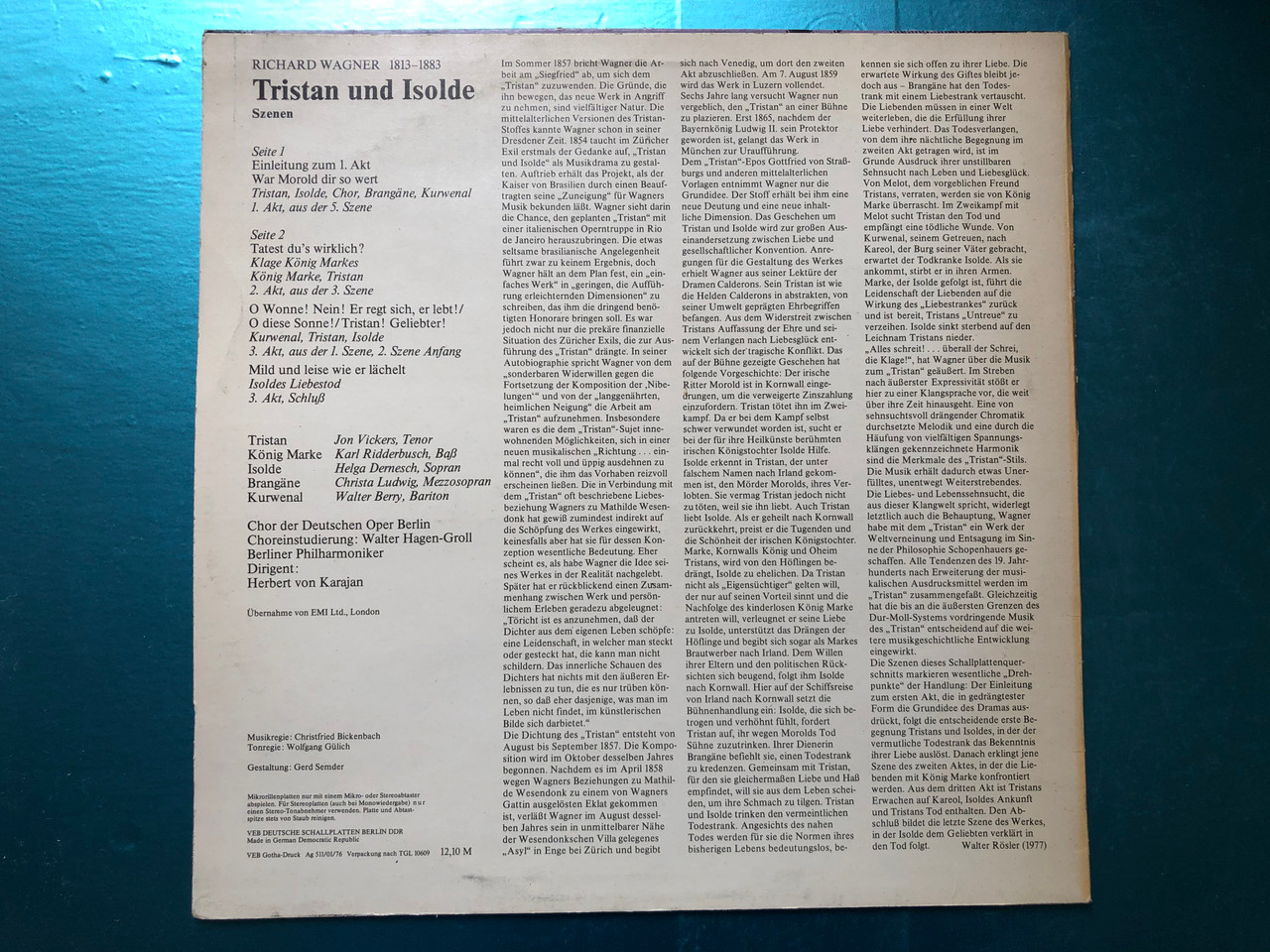Description
Richard Wagner - Tristan Und Isolde (Szenen) / Helga Dernesch, Jon Vickers, Christa Ludwig, Walter Berry, Karl Ridderbusch, Chor der Deutschen Oper Berlin, Berliner Philharmoniker, Herbert von Karajan / ETERNA LP 1976 Stereo
8 27 009
Tristan und Isolde (Tristan and Isolde), WWV 90, is an opera in three acts by Richard Wagner to a German libretto by the composer, based largely on the 12th-century romance Tristan by Gottfried von Strassburg. It was composed between 1857 and 1859 and premiered at the Königliches Hoftheater und Nationaltheater in Munich on 10 June 1865 with Hans von Bülow conducting. Wagner referred to the work not as an opera, but called it "eine Handlung" (literally a drama, a plot or an action).
Wagner's composition of Tristan und Isolde was inspired by the philosophy of Arthur Schopenhauer (particularly The World as Will and Representation), as well as by Wagner's affair with Mathilde Wesendonck. Widely acknowledged as a pinnacle of the operatic repertoire, Tristan was notable for Wagner's unprecedented use of chromaticism, tonal ambiguity, orchestral colour and harmonic suspension.
The opera was enormously influential among Western classical composers and provided direct inspiration to composers such as Gustav Mahler, Richard Strauss, Alban Berg, Arnold Schoenberg, and Benjamin Britten. Other composers like Claude Debussy, Maurice Ravel, and Igor Stravinsky formulated their styles in contrast to Wagner's musical legacy. Many see Tristan as a milestone on the move away from common practice harmony and tonality and consider that it lays the groundwork for the direction of classical music in the 20th century. Both Wagner's libretto style and music were also profoundly influential on the symbolist poets of the late 19th century and early 20th century.
A Trisztán és Izolda (németül Tristan und Isolde) Richard Wagner egyik háromfelvonásos operája (WWV 90). Librettóját a zeneszerző írta Gottfried von Straßburg versregénye alapján. Ősbemutatójára 1865. június 10-én került sor a müncheni Königliches Hof- und Nationaltheaterben. Magyarországon 1901. november 28-án mutatták be a budapesti operaházban.
Tracklist:
| Tristan Und Isolde (Szenen) | |||
| A1 | Einleitung Zum 1. Akt | ||
| A2 | War Morold Dir So Wert | ||
| B1 | Tatest Du's Wirklich? | ||
| B2 | O Wonne! Nein! Er Regt Sich, Er Lebt! | ||
| B3 | Mild Und Leise Wie Er Lächelt |
- Baritone Vocals [Kurwenal] – Walter Berry
- Bass Vocals [König Marke] – Karl Ridderbusch
- Chorus – Chor der Deutschen Oper Berlin
- Chorus Master – Walter Hagen-Groll
- Composed By – Richard Wagner
- Conductor – Herbert von Karajan
- Engineer – Wolfgang Gülich
- Mezzo-soprano Vocals [Brangäne] – Christa Ludwig
- Orchestra – Berliner Philharmoniker
- Recording Supervisor – Christfried Bickenbach
- Sleeve Notes – Walter Rösler
- Soprano Vocals [Isolde] – Helga Dernesch
- Tenor Vocals [Tristan] – Jon Vickers















